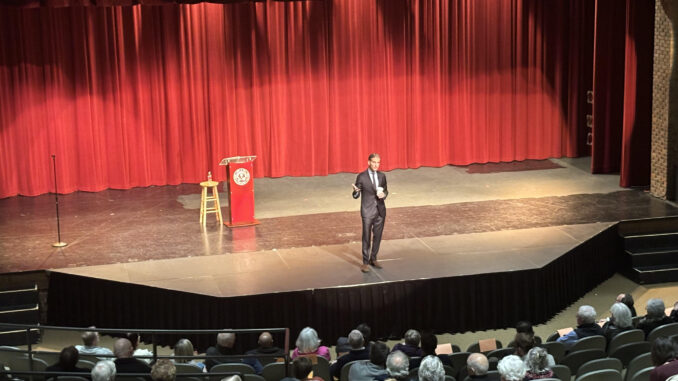
By Brandon Fletcher—
On March 18th, Harvard Law Professor Noah R. Feldman visited Dave Finkelman Auditorium to discuss artificial intelligence (AI) and the likely effects it will have on our society.
He gave several examples. In one example he asked the audience how many would prefer a
doctor who is correct eight times out of ten, or AI that is correct nine out of ten times. It was
close, but it seemed the majority of the audience preferred the AI. He gave another example
about someone using an AI partner instead of a real partner. Most people would find it odd to
have an AI partner instead of a real partner; there would be something important missing. The
point Professor Feldman was trying to demonstrate is there will be a great many changes in
store for all of us as AI proliferates. There will also be many jobs that can be done by more
precise machines, but the human aspect we all value should remain.
During the question and answer portion that followed his talk, one audience member wondered
aloud how close we are to a “Skynet” type event, using a fictional reference to an AI software
program in a Terminator movie that developed sentience. In this movie, Skynet eventually
created an army of evil machines that sought to wipe out the human race. In reality, while AI is
certainly developing rapidly, we are far from experiencing a Skynet-type of event. The point that
Dr. Feldman was making is that human life and connection are valuable. These are things that
AI cannot replicate—not now, and maybe not ever. Dr. Feldman did demonstrate, however, that
AI has become very capable of mimicking human interaction, although what we value the most
as human beings can never be fully replaced by AI. The machines likely will never become
conscious, they are only capable of superficially replicating human interaction.
Dr. Feldman also brought up concerns of students not being able to meet their full potential with
possible abuses of AI. He expressed that it is important for the world to have educated students
that can behave as adults and understand how to best do their jobs. AI is clearly becoming
more commonplace, and is sometimes now being used for nefarious purposes like in cases
involving academic dishonesty. These sorts of issues are ones we all need to be mindful of,
since they closely affect the education of future generations.
Overall, Professor Feldman held an informative and educational discussion that highlighted
potentially good uses of AI, showed listeners how far AI is advancing, and warned us of
potentially troubling uses of AI. Many applications of AI are indeed helpful and the human
aspect is something that is irreplaceable.
For more information about events on campus visit events.miamioh.edu
